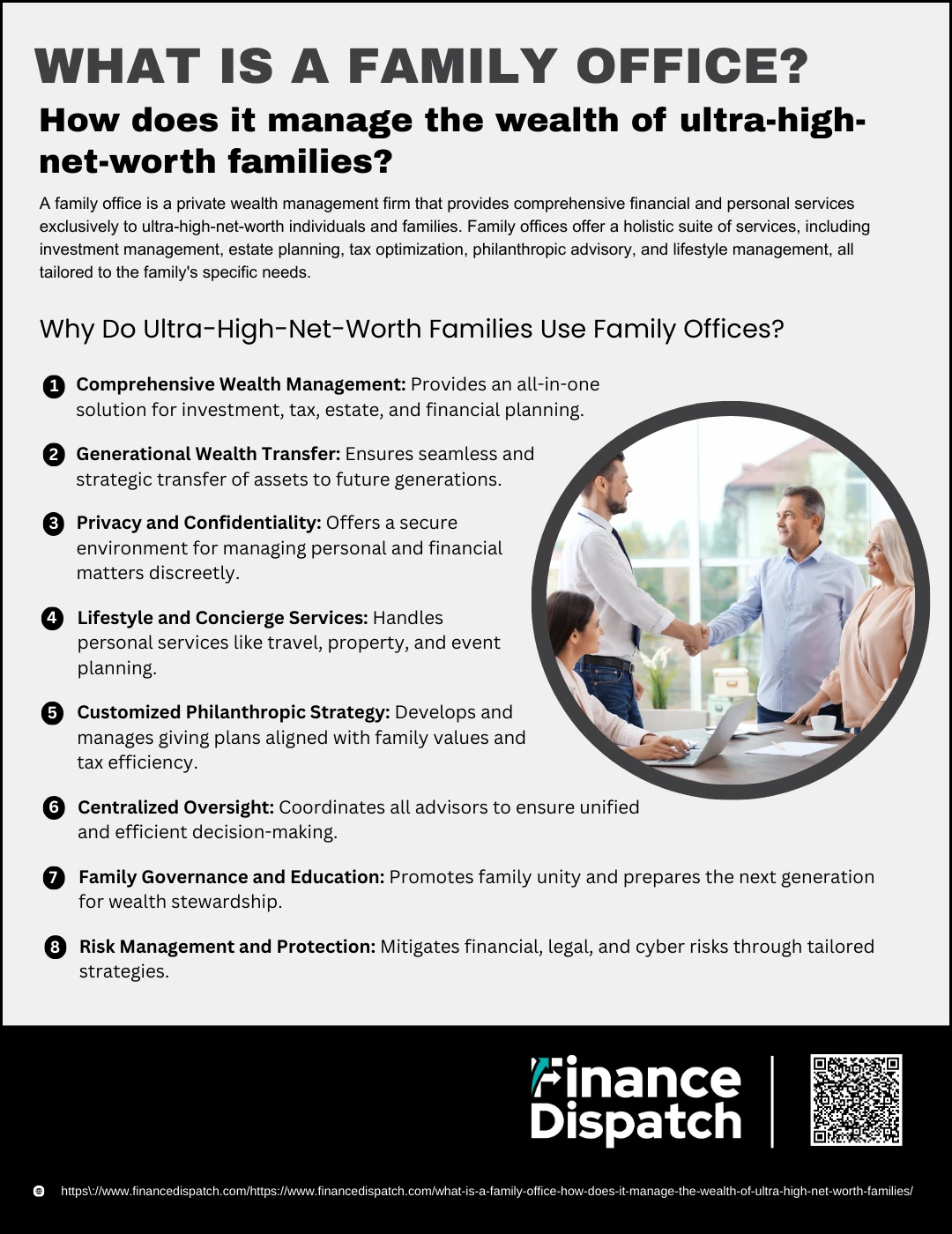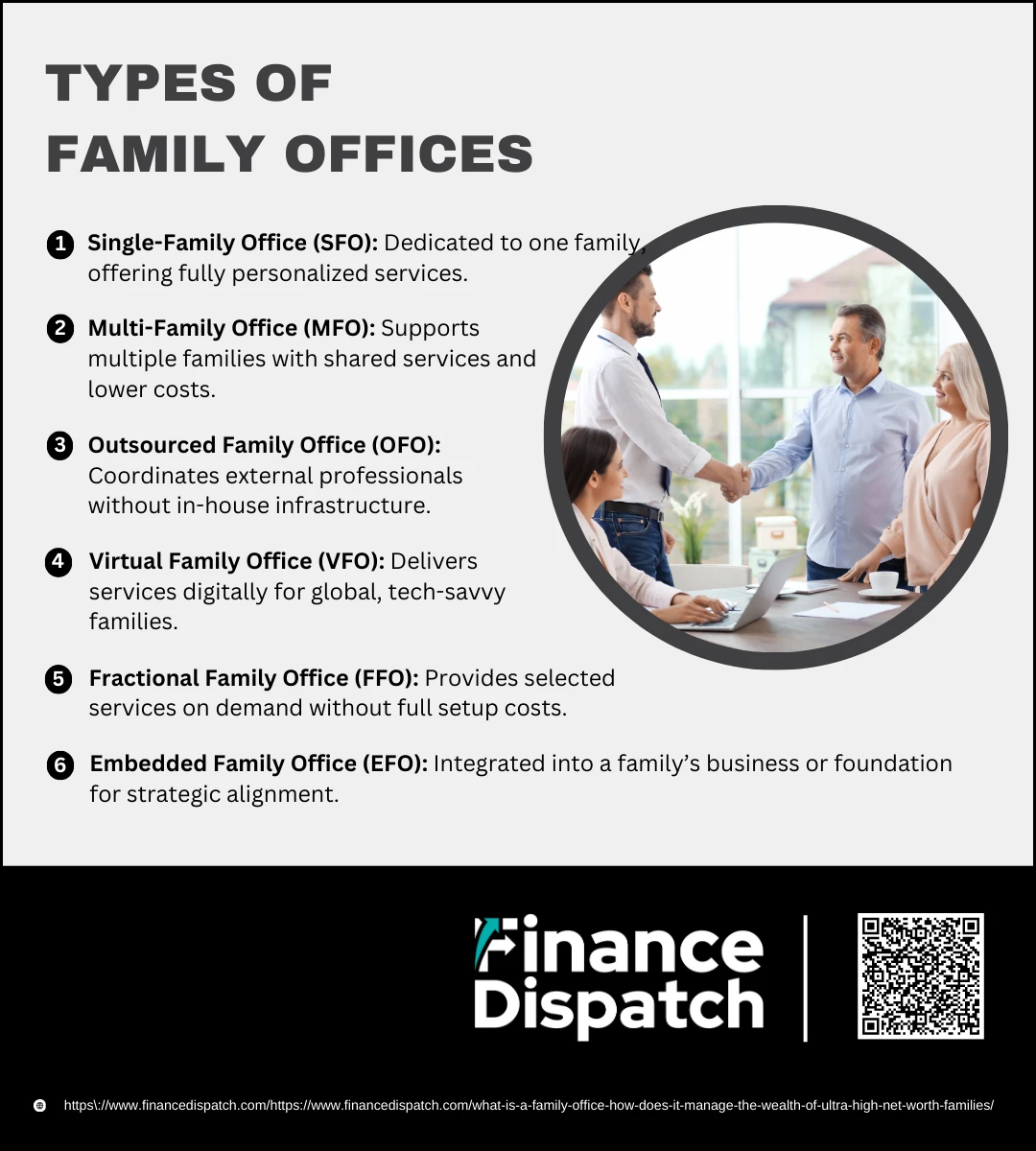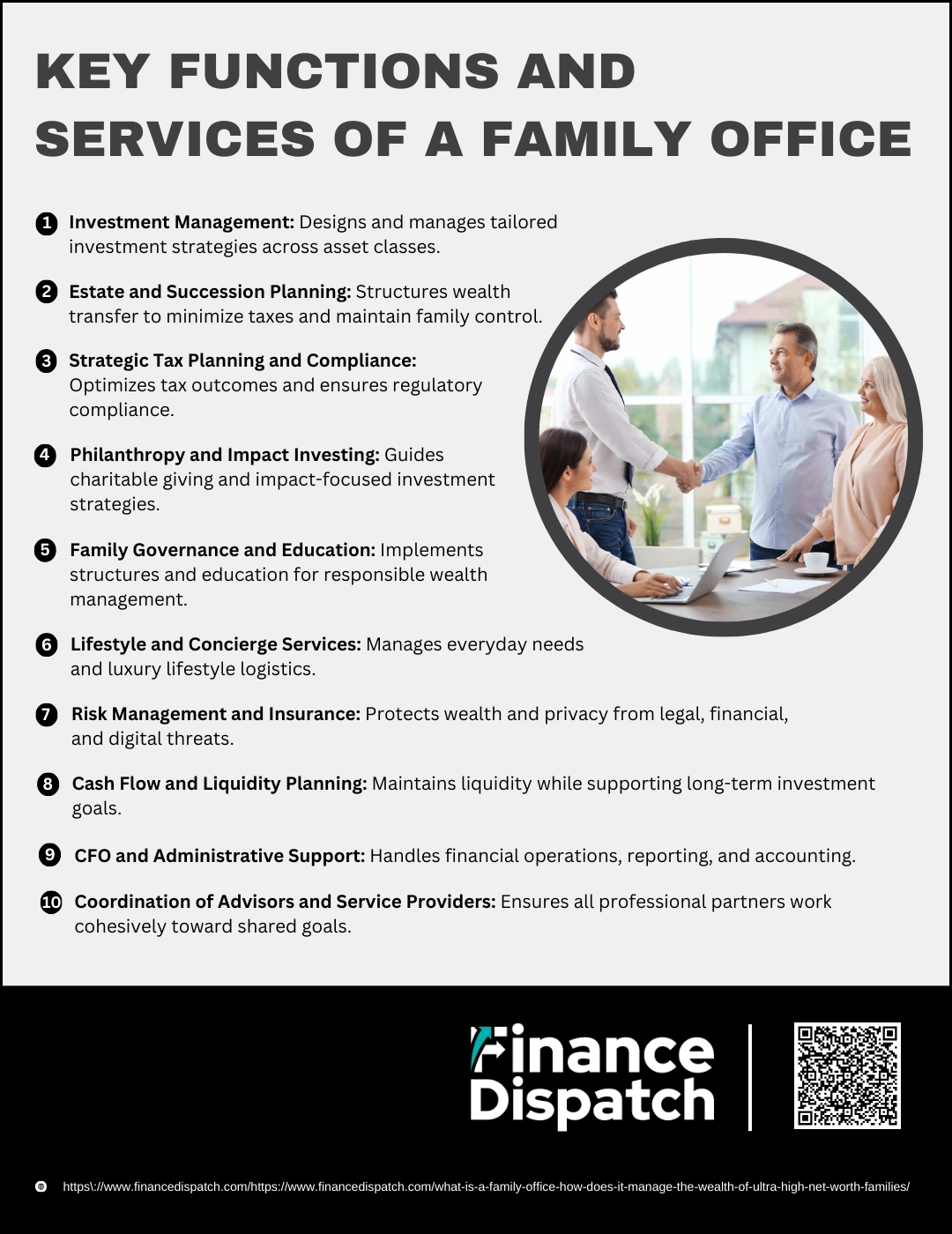In an age of rising global wealth, ultra-high-net-worth families face increasingly complex financial, legal, and lifestyle challenges that go far beyond traditional investment advice. Managing a vast portfolio of assets, planning for generational wealth transfer, and maintaining privacy require a level of support that standard wealth advisors often cannot provide. This is where family offices come in. Designed as comprehensive private advisory firms, family offices serve as centralized hubs for managing all aspects of a family’s financial and personal affairs. In this article, we explore what a family office is and how it plays a pivotal role in preserving, growing, and protecting the wealth and legacy of the ultra-wealthy.
What is a Family Office?
A family office is a private wealth management firm established to serve the financial and personal needs of ultra-high-net-worth individuals or families. Unlike traditional financial advisory services, which may focus solely on investment management, a family office offers a holistic approach—integrating everything from tax planning, estate structuring, and philanthropic advisory to lifestyle management and family governance. These offices are tailored to each family’s unique objectives, ensuring long-term wealth preservation and seamless intergenerational wealth transfer. By consolidating professional expertise under one coordinated structure, family offices provide unmatched personalization, control, and confidentiality.
 Why Do Ultra-High-Net-Worth Families Use Family Offices?
Why Do Ultra-High-Net-Worth Families Use Family Offices?
Ultra-high-net-worth (UHNW) families often have financial lives that are not only vast in scale but also deeply intricate in structure. Managing hundreds of millions—or even billions—of dollars involves far more than investment advice. It requires a coordinated strategy that touches on taxes, estate planning, philanthropy, family education, lifestyle needs, and risk management. Family offices offer a bespoke solution, acting as a centralized command center to simplify, integrate, and optimize every facet of a family’s financial and personal life. These offices are particularly attractive because they offer high levels of privacy, customization, and continuity—all essential to preserving both wealth and legacy over generations.
Here are the key reasons ultra-wealthy families turn to family offices:
1. Comprehensive Wealth Management
Family offices provide a one-stop solution for all financial needs—combining investment management, tax planning, estate strategy, and financial reporting under a single, personalized framework. This holistic approach ensures that every financial decision is aligned with the family’s broader objectives.
2. Generational Wealth Transfer
Preserving wealth is not just about growing assets; it’s about ensuring smooth transitions to future generations. Family offices design and implement succession plans, establish trusts, and provide legal and tax structures to reduce friction and preserve capital across decades.
3. Privacy and Confidentiality
UHNW families often value discretion. Family offices operate independently from large financial institutions, offering a shielded environment where sensitive data and personal affairs are managed with the utmost confidentiality.
4. Lifestyle and Concierge Services
Beyond financial tasks, many family offices manage aspects of daily life—such as arranging private travel, maintaining luxury properties, hiring household staff, and organizing exclusive events—freeing the family to focus on business or leisure.
5. Customized Philanthropic Strategy
Family offices help define a family’s philanthropic mission, structure giving through donor-advised funds or private foundations, and handle compliance and impact tracking—ensuring donations align with both values and tax strategies.
6. Centralized Oversight
With multiple advisors—legal, financial, tax-related—involved, coordination can be complex. Family offices act as a central hub to harmonize these professionals, minimizing miscommunication and streamlining execution.
7. Family Governance and Education
To avoid internal conflicts and foster financial stewardship, family offices often implement governance structures and offer education for younger generations. This may include training on investment principles, ethical wealth usage, and leadership development.
8. Risk Management and Protection
Wealth attracts risk—from lawsuits to cyber threats. Family offices proactively assess and mitigate these risks through insurance planning, cybersecurity protocols, asset protection structures, and legal oversight.
 Types of Family Offices
Types of Family Offices
Family offices are not one-size-fits-all. They come in various forms, each designed to meet the specific financial, operational, and lifestyle needs of the families they serve. The choice of structure often depends on factors such as the family’s net worth, level of desired control, complexity of assets, and willingness to share costs with others. Understanding the different types of family offices is essential for selecting the model that best aligns with a family’s goals, privacy requirements, and resource expectations.
Here are the main types of family offices:
1. Single-Family Office (SFO)
A Single-Family Office serves only one family. It offers complete personalization and control, managing everything from investments and tax planning to staff hiring and philanthropic projects. Due to its exclusivity and overhead, this model is typically reserved for families with $200 million or more in assets.
2. Multi-Family Office (MFO)
A Multi-Family Office supports several families, allowing them to share services, professionals, and costs. While it may not offer the same level of customization as an SFO, it provides access to high-quality expertise and infrastructure at a more affordable price—making it ideal for families with $30 million to $200 million in wealth.
3. Outsourced Family Office (OFO)
This model doesn’t maintain an in-house team but instead coordinates external professionals—such as accountants, lawyers, and investment advisors—to deliver a comprehensive service. It’s a cost-effective option for families seeking expert support without managing a full internal staff.
4. Virtual Family Office (VFO)
Built on digital infrastructure, a Virtual Family Office relies on remote teams and technology to provide services across geographies. It suits globally dispersed or tech-savvy families looking for flexibility, privacy, and lower operational costs without sacrificing service quality.
5. Fractional Family Office (FFO)
A Fractional Family Office offers a scaled-down version of full-service support, where families can choose specific services—like investment oversight or estate planning—without committing to the cost of a complete setup. This is ideal for families that want focused help in certain areas.
6. Embedded Family Office (EFO)
Embedded within a family’s business or foundation, this model integrates wealth management into existing operations. It maintains close alignment with family values and business goals, making it ideal for entrepreneur-led families who prefer a hands-on, embedded solution.
 Key Functions and Services of a Family Office
Key Functions and Services of a Family Office
Family offices are built to simplify the complex lives of ultra-high-net-worth families by integrating a broad range of services under one strategic and coordinated umbrella. Unlike traditional financial advisors who often focus narrowly on investment guidance, a family office manages both financial and non-financial aspects of a family’s life. These services are not just about preserving wealth—they’re about building a legacy, maintaining privacy, ensuring seamless daily operations, and empowering future generations. Each function is tailored to meet the unique needs, goals, and values of the family, resulting in an end-to-end solution that spans across generations.
Here are the key functions and services of a family office, explained in greater depth:
1. Investment Management
Family offices develop and manage personalized investment strategies that reflect the family’s goals, risk tolerance, and time horizon. This includes diversification across asset classes such as equities, fixed income, private equity, real estate, hedge funds, and venture capital. They also handle due diligence, performance tracking, and consolidated reporting—ensuring investments align with the family’s broader objectives.
2. Estate and Succession Planning
A family office helps design long-term strategies for transferring wealth to future generations. This includes setting up trusts, drafting wills, and structuring estates to minimize tax burdens and avoid legal disputes. It also involves preparing successors through legal, financial, and leadership planning to maintain business continuity and family unity.
3. Strategic Tax Planning and Compliance
Proactive tax planning is crucial for preserving wealth. Family offices create tax-efficient structures by collaborating with tax attorneys and CPAs to manage liabilities across jurisdictions. This may involve optimizing income and capital gains taxes, managing charitable deductions, and filing complex tax returns on behalf of the family and its entities.
4. Philanthropy and Impact Investing
For families passionate about giving back, family offices assist in defining philanthropic missions, creating charitable trusts or foundations, and managing donations. They also help track the social impact of contributions and ensure compliance with regulatory guidelines. Impact investing strategies may also be designed to generate financial returns while supporting social or environmental causes.
5. Family Governance and Education
To sustain harmony and shared vision, family offices establish governance structures such as family councils, regular meetings, and voting systems. They also provide financial education and training for younger members to prepare them for future responsibilities, leadership roles, and informed wealth stewardship.
6. Lifestyle and Concierge Services
These services simplify everyday life and enhance quality of living. This may include managing luxury properties, hiring private staff, arranging VIP travel, scheduling medical appointments, planning events, or securing educational opportunities for children. It frees up the family to focus on what matters most—personal passions and well-being.
7. Risk Management and Insurance
Family offices assess risks related to assets, businesses, reputation, and personal safety. They design insurance strategies to cover property, life, liability, and specialty areas like art or aircraft. With growing digital threats, cybersecurity and privacy protections are also often integrated into the risk strategy.
8. Cash Flow and Liquidity Planning
Families often hold wealth in illiquid assets like businesses or real estate. A family office monitors cash needs, plans for large purchases or liquidity events, and ensures the family has access to funds when needed—without disrupting long-term investments.
9. CFO and Administrative Support
Acting as a financial operations center, a family office provides accounting, bookkeeping, payroll, and expense tracking services. It may also produce detailed financial reports to give the family clarity and control over all monetary activity. This ensures transparency, compliance, and timely financial decision-making.
10. Coordination of Advisors and Service Providers
Many families work with multiple professionals—attorneys, accountants, bankers, and investment managers. A family office acts as the integrator, ensuring all these experts collaborate efficiently and consistently toward the family’s unified goals. This coordination helps eliminate redundancies, reduce conflicts, and streamline decision-making.
How Family Offices Manage Investment Portfolios
Managing an investment portfolio for an ultra-high-net-worth family involves much more than choosing a mix of stocks and bonds. Family offices take a strategic, long-term approach that reflects each family’s financial objectives, risk tolerance, and generational priorities. With access to private markets and alternative investments, they can construct diversified, custom portfolios designed to preserve and grow wealth across decades. Every decision—from asset allocation to manager selection—is carefully coordinated to align with the family’s overarching vision.
Here are some of the ways family offices manage investment portfolios:
1. Goals-Based Investment Strategy
Portfolios are built around the family’s specific goals—such as income generation, capital appreciation, or philanthropic funding—ensuring that investments support both short- and long-term needs.
2. Diversification Across Asset Classes
To reduce risk, family offices invest in a mix of asset classes including public equities, fixed income, real estate, private equity, hedge funds, infrastructure, and commodities.
3. Direct and Alternative Investments
Many family offices prefer direct ownership in private companies, venture capital, and other alternatives, offering more control and potential for higher returns than public markets.
4. Risk Management and Hedging
Investment portfolios include strategies to mitigate market volatility, currency risk, and concentration exposure, often through derivatives or hedging tools.
5. Manager Selection and Oversight
Family offices conduct rigorous due diligence to select external fund managers and continuously monitor performance against benchmarks and objectives.
6. Tax-Efficient Structuring
Investment decisions are made with careful attention to tax implications, incorporating tax-loss harvesting, asset location strategies, and use of trusts or holding companies.
7. Impact and ESG Investing
Some families prioritize environmental, social, and governance (ESG) factors or mission-driven investing, integrating values with financial performance.
8. Customized Reporting and Analytics
Detailed and consolidated reports provide real-time insight into performance, risk exposure, and compliance—supporting transparency and informed decision-making.
Estate Planning and Wealth Transfer
Estate planning and wealth transfer are fundamental functions of a family office, aimed at preserving wealth and ensuring its smooth transition across generations. Family offices work closely with legal and tax experts to design comprehensive strategies that protect assets, minimize estate and inheritance taxes, and align with the family’s long-term vision. This often involves the creation and management of trusts, wills, and holding structures that safeguard family wealth from legal disputes, creditors, and unnecessary taxation. Beyond the legal and financial aspects, family offices also guide succession planning—preparing heirs for leadership, ownership, and financial responsibility. By facilitating structured wealth transfer and continuity, a family office helps maintain family unity, protect the legacy, and ensure lasting financial security for future generations.
Lifestyle and Non-Financial Services of Family Office
In addition to managing complex financial matters, family offices also provide a wide range of lifestyle and non-financial services that enhance the day-to-day lives of ultra-high-net-worth families. These services are tailored to meet personal preferences, ensure convenience, and support a seamless lifestyle. Acting as personal concierges and executive assistants, family offices help manage everything from household operations to travel logistics—allowing families to focus on their passions, businesses, and personal well-being.
Here are some common lifestyle and non-financial services provided by family offices:
1. Private Travel and Aviation Management
Arranging private jet charters, scheduling flights, coordinating travel logistics, and handling airport services worldwide.
2. Luxury Property and Real Estate Management
Overseeing maintenance, renovations, and staffing for multiple homes and vacation properties around the globe.
3. Household Staffing and HR
Recruiting, vetting, and managing domestic staff such as chefs, nannies, drivers, and estate managers, including payroll and benefits administration.
4. Medical and Wellness Coordination
Scheduling health checkups, securing top-tier medical specialists, managing elder care, and arranging wellness retreats or fitness programs.
5. Education and Tutoring Support
Assisting with school and university applications, hiring private tutors, and advising on educational paths for children and young adults.
6. Event Planning and Entertainment Access
Organizing private events, celebrations, and VIP experiences, including access to exclusive concerts, art shows, or sports events.
7. Art and Collectibles Management
Acquiring, appraising, insuring, and maintaining fine art, antiques, jewelry, or collectible assets.
8. Security and Privacy Services
Implementing personal security measures, cybersecurity protocols, and protecting confidential information across digital and physical spaces.
9. Technology and Digital Life Support
Managing home automation, communication systems, digital storage, and IT infrastructure for enhanced comfort and security.
Family Office vs. Traditional Wealth Advisory Firms
While both family offices and traditional wealth advisory firms serve affluent clients, they differ significantly in scope, structure, and personalization. Traditional wealth advisory firms typically focus on investment management and basic financial planning, catering to multiple clients with standardized services. In contrast, family offices provide a far more comprehensive, bespoke solution that addresses every facet of a family’s financial and personal life—from tax planning and estate structuring to concierge services and philanthropic strategy. This high-touch, all-encompassing approach makes family offices particularly suited to ultra-high-net-worth families with complex needs.
Here is a comparison between family offices and traditional wealth advisory firms:
| Feature | Family Office | Traditional Wealth Advisory Firm |
| Client Focus | One or a few ultra-wealthy families | Broad client base across various wealth levels |
| Service Scope | Holistic (financial + non-financial services) | Primarily financial services (e.g., investments, planning) |
| Personalization | Highly customized, family-specific solutions | Standardized or semi-customized offerings |
| Control and Decision-Making | Full control retained by the family | Shared or advisor-driven decision-making |
| Staffing and Resources | In-house dedicated team or coordinated professionals | External advisors working for many clients |
| Privacy and Confidentiality | Extremely high; internal and discrete | Moderate; depends on firm structure |
| Cost Structure | High, often fixed or operational budget-based | Typically percentage-based fees (AUM model) |
| Lifestyle and Concierge Services | Included (travel, security, education, etc.) | Rarely offered |
| Legacy and Governance Support | Strong focus on family education and succession planning | Limited to no family governance services |
| Integration of Services | Seamlessly coordinated across disciplines | Often fragmented or outsourced |
When Should You Consider Establishing a Family Office?
Establishing a family office is a significant step that typically becomes relevant when a family’s wealth, lifestyle, and legacy goals surpass what traditional financial services can effectively manage. It’s not just about the amount of wealth—it’s about the complexity involved in overseeing multiple investments, assets, tax jurisdictions, and family dynamics. When your financial life requires a more tailored, private, and integrated approach, a family office can offer the comprehensive infrastructure needed to preserve and grow wealth across generations.
Here are key situations when you should consider setting up a family office:
1. Your net worth exceeds $100 million
While there is no strict threshold, families with $100 million or more in investable assets often find the services of a family office financially justifiable and operationally valuable.
2. You manage diverse and complex assets
Real estate holdings, business interests, international investments, and alternative assets require coordinated expertise that a family office can centralize.
3. You are planning intergenerational wealth transfer
A family office can help develop estate and succession plans that ensure a smooth and tax-efficient transition of wealth to the next generation.
4. You need a consolidated advisory team
Coordinating accountants, lawyers, investment managers, and other professionals under one roof reduces duplication and improves strategic decision-making.
5. Your lifestyle requires high-touch support
If your family needs concierge services such as private travel, household staff management, or education planning, a family office can manage these seamlessly.
6. You want to align wealth with family values
Whether through philanthropy, impact investing, or family governance structures, a family office supports long-term goals that go beyond financial returns.
7. You are dissatisfied with fragmented financial services
If working with multiple firms has led to confusion or inefficiencies, a family office can provide the centralized control and integration you need.
8. You want privacy and discretion
A family office structure allows you to handle sensitive financial and personal matters with confidentiality and control, away from public or corporate scrutiny.
Challenges and Considerations Faced by Family Offices
While family offices offer unparalleled personalization and comprehensive wealth management, they are not without challenges. Managing the financial and personal affairs of ultra-high-net-worth families involves navigating complex dynamics, evolving regulations, and significant operational demands. Establishing and maintaining a family office requires careful planning, substantial investment, and a commitment to long-term strategy. Families must also address internal governance, succession issues, and technological needs to ensure their office runs smoothly and adapts to future generations.
Here are some of the key challenges and considerations faced by family offices:
1. High Operating Costs
Running a family office can be expensive, particularly for single-family setups, with costs including salaries, legal services, compliance, technology, and office infrastructure.
2. Talent Acquisition and Retention
Attracting and keeping qualified professionals—such as investment advisors, tax experts, and legal counsel—is essential but competitive and challenging.
3. Family Governance and Internal Conflicts
Differing priorities and personalities among family members can lead to disagreements, especially in the absence of clear governance structures or decision-making frameworks.
4. Succession Planning
Transitioning leadership or ownership from one generation to the next requires thoughtful preparation to avoid disruptions and ensure continuity.
5. Operational Complexity
Coordinating a wide range of services—from investment and tax planning to concierge support—demands robust systems, skilled management, and constant oversight.
6. Cybersecurity and Data Privacy
The sensitive nature of a family’s financial and personal data makes them prime targets for cyberattacks, requiring advanced cybersecurity measures.
7. Regulatory and Tax Compliance
Operating across multiple jurisdictions means staying compliant with various tax laws and financial regulations, which can be time-consuming and costly.
8. Technology Integration
Family offices must continually adopt and manage advanced financial software, reporting tools, and digital platforms to maintain efficiency and transparency.
9. Next-Generation Engagement
Educating and involving younger family members in wealth stewardship is essential but can be difficult if they lack interest or understanding of the office’s purpose.
10. Scalability and Flexibility
As families grow and financial interests evolve, family offices must remain adaptable and scalable to meet changing needs and expectations.
Conclusion
In conclusion, family offices serve as a powerful and highly personalized solution for ultra-high-net-worth families seeking to manage, preserve, and grow their wealth across generations. By integrating financial planning, investment management, estate strategy, lifestyle services, and family governance under one centralized structure, they offer unmatched control, privacy, and efficiency. However, the decision to establish a family office comes with significant responsibilities, costs, and strategic considerations. When thoughtfully structured and professionally managed, a family office can provide the clarity, continuity, and support needed to sustain a family’s legacy well into the future.



